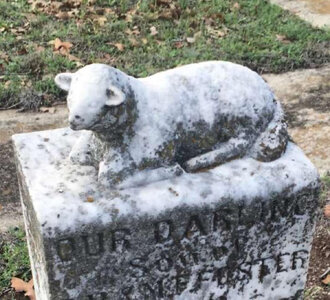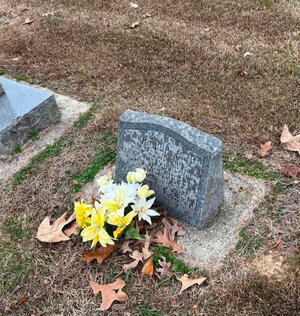donbosco
Legend of ZZL
- Messages
- 5,639

These days I live away from #DeepChatham but I manage frequent visits in my thoughts (and stories) and every once in a while I make an actual pilgrimage. Driving those narrow back roads through the countryside — “the goodliest soile under the Cope of Heaven” as Ralph Lane called it back in the 16th century — I have found a certain comfort in the splendid isolation and comparative emptiness of it all.
I pass by Sandy Branch Baptist Church where I have visited my parents and grandparents resting places. I have left an apple or sometimes an “ink pen” each for Momma and Deddy. Beside the graves of Grandpa and Grandma sits a small, newish marker for Virginia Etta. She was not quite 10 months old having been born December 28, 1927, she died on September 11, 1928. Virginia was Deddy’s little sister and the fifth child of Willis and Ila. Her death clearly had a lifelong influence on Deddy because in the 1980s he purchased a new headstone for her — 50 plus years later. He was the oldest, a big brother of 12 when she passed away.
While we think of The Great Depression as beginning with the Stock Market Crash of October 28, 1929, economic historians point out that hard times had already hit places like rural Chatham County quite a bit before that date and the tobacco farm and shade tree mechanic operation that Grandpa and Grandma had going was probably pretty precariously perched when little Virginia Etta got sick.
Not long after the infant’s death the whole family moved to Durham for a year or so, not able to survive on the farm. Grandpa landed a job mechanicking and Grandma worked cleaning on the Duke campus, established there in 1892 as Trinity College (after a Randolph County start-up) but only recently (1924) purchased and renamed by Buck Duke for his father.
Deddy once pointed out their neighborhood to me, his singular experience in urban living of the 93 years he spent on earth. I ramble a bit but these stories connect for me from small to the large and help make the people of the past more real. Grandpa and Grandma must have been struggling in those days - four children under 12, a pandemic and a World War recently in their rear view mirror, and ends becoming increasingly hard to meet as all around them free market capitalism was failing. The old rules no longer applied. It was around that time, fall and harvest, that I believe that my Deddy lost all but his thumb on his left hand in a sorghum mill accident.
I only heard him speak details a couple of times of his misfortune. Not once did I ever hear a complaint though the missing fingers required him to do most things differently that the rest of us take for granted - and always with a good deal of forethought. He said he had pushed his hand too far into the machinery as he fed the sorghum and his hand was mangled. They rode to Greensboro - 50 miles in a “jalopy” over unimproved highways - to the only hospital. The trip must have been frightening and excruciatingly painful.
Perhaps the costs from his injury and the death of little Virginia set the family off kilter financially. Such bad luck in the time when crops were gathered and marketed may have meant losses that seemed insurmountable. So the Grandpa, Grandma, and the three children left Sandy Branch in #DeepChatham behind for the city of Durham. These days I can only wish that I knew more. I can piece together the stories that I heard and dig through census, property, birth, and death records and read old newspapers but I do have to make some leaps of faith because in the old days I didn’t know enough to ask the best questions.
I have to wonder - because he never said - if when a half-century after the death of his little sister of but just shy of 10 months on earth that he replaced her headstone, the classic Lamb Reclining so prevalent in early 20th century cemeteries marking infant passings, with a new one, this one with her birth and death recorded in stone — that Deddy was still working through that traumatic time. I know that it gave him peace to remember his sister - to show to himself and the world that she was not forgotten.
That fall launched Deddy and his family off the farm and everything they knew into the unfamiliar city. Transformed by circumstances — bad breaks both global and personal - they migrated in search of a place that appeared they might better survive. I’m glad they eventually returned to the farm to be sure but how very close they came from everything being so incredibly different then - and ultimately - now. From a baby’s death in the early fall to a life-rearranging accident on a dirt-scratch farm in the country to a global economic collapse that sent a country boy into the city and back again - this is a story pieced together so not to be lost.

Last edited:
